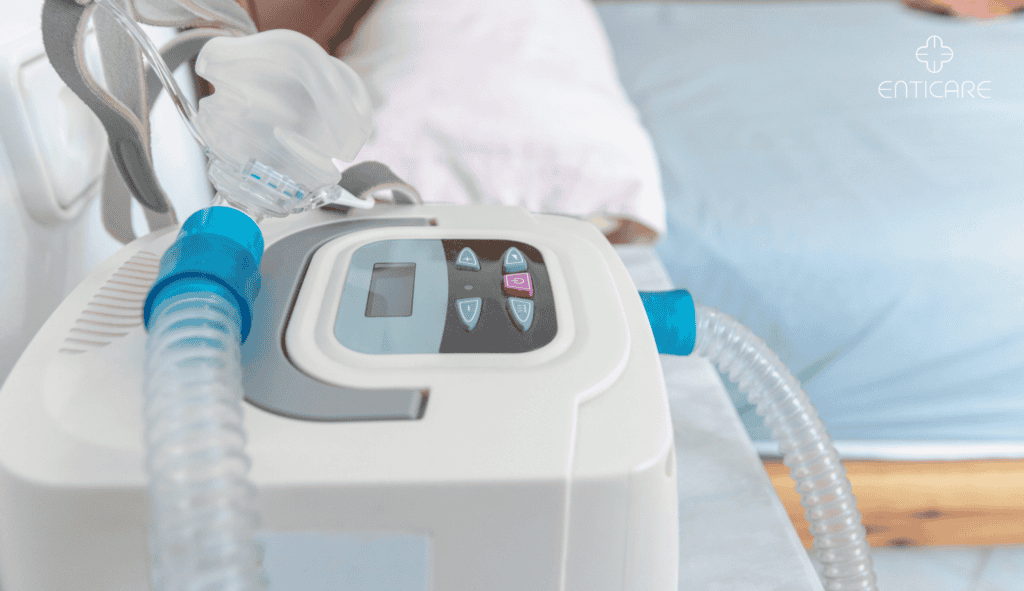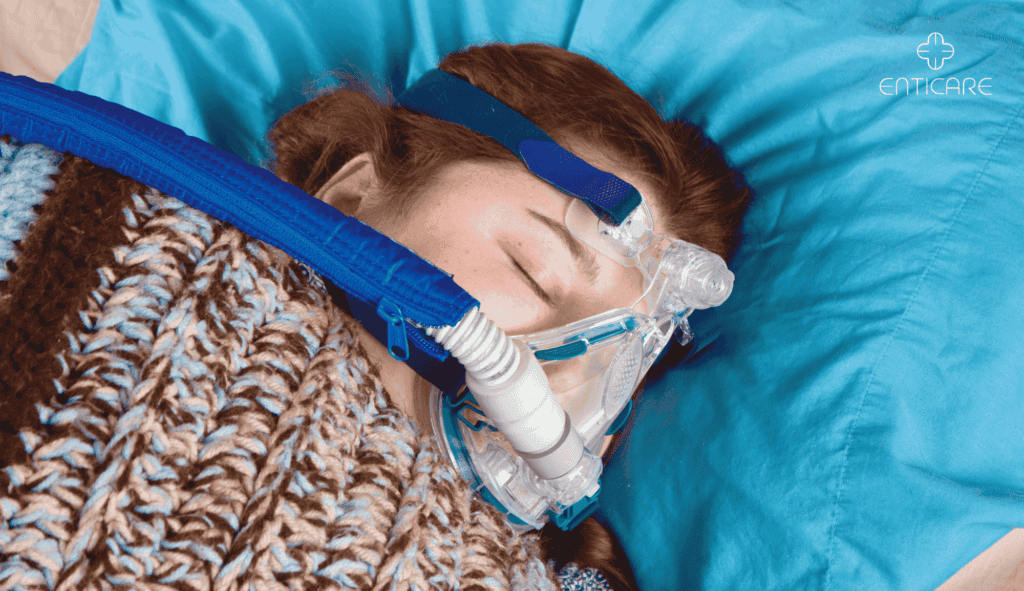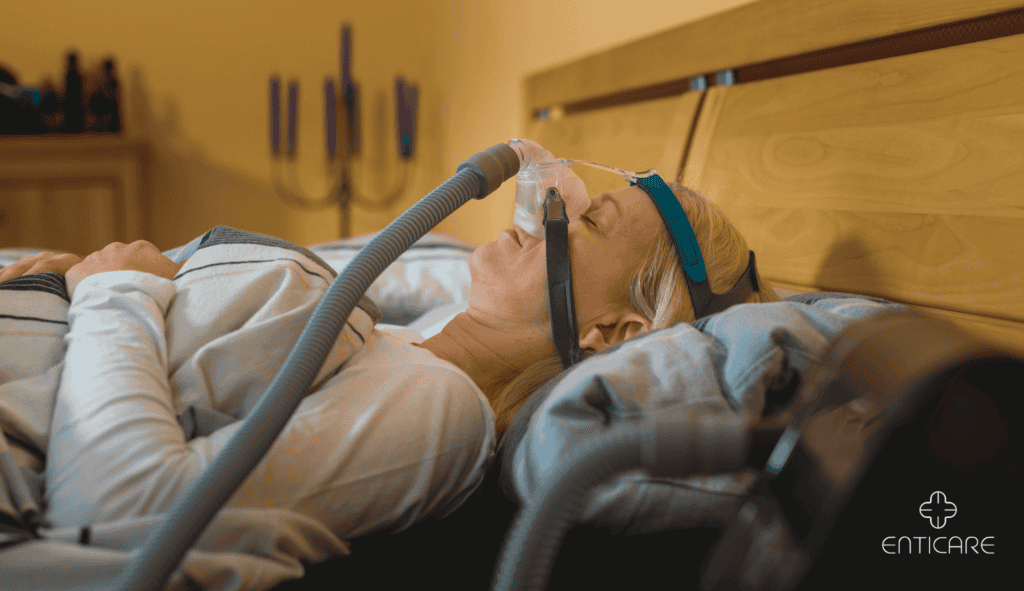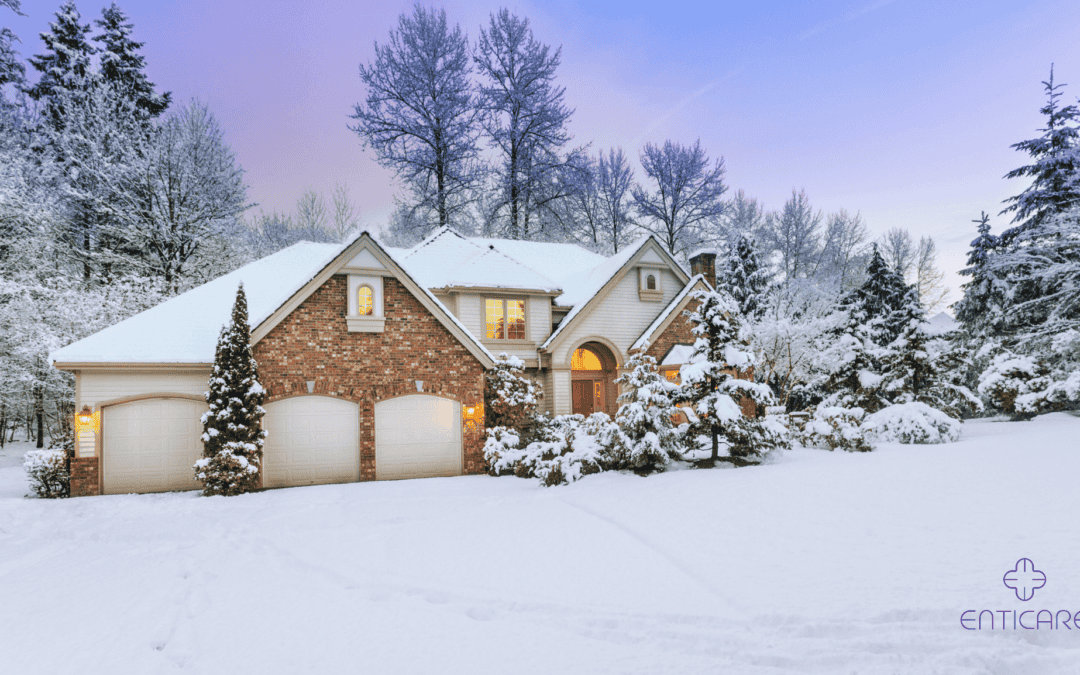The winter season often brings many challenges for people using CPAP (Continuous Positive Airway Pressure) machines. Cold air temperature can exacerbate the discomfort associated with sleep apnea treatment, such as dry mouth, nasal congestion, and irritated airways. The good news is that CPAP machines come with built-in humidifiers, which help add moisture to the air you breathe, making your therapy more comfortable and practical—especially during winter when the air tends to be drier.
In this guide, we’ll explore how to optimize your CPAP humidifier settings for winter to ensure you get a good night’s sleep and prevent common issues caused by dry, cold air.

Understanding CPAP Humidifiers
What is a CPAP Humidifier?
A CPAP humidifier is essential to CPAP therapy, particularly for those managing obstructive sleep apnea (OSA). This device adds moisture to the air delivered by your CPAP machine, helping to alleviate dryness and discomfort in your nasal passages and throat. Incorporating a CPAP humidifier into your therapy can significantly reduce common side effects such as nasal congestion and sore throats, making your treatment more comfortable and practical. The added moisture helps soothe irritated airways, ensuring you can breathe easier and sleep better.
Why CPAP Humidification Is Essential in Winter
CPAP therapy relies on continuous air flow to keep your airways open during sleep. While this therapy is vital for managing sleep apnea, using the device during winter without proper humidification can cause many problems. CPAP humidity is essential for preventing dryness and irritation, but excessive humidity can accumulate moisture in the mask and hose, known as rainout.
The Dry Air Problem
During winter, the air tends to be much drier, especially indoors, where heating systems remove moisture from the environment. Breathing in dry air while using your CPAP machine can lead to dry nasal passages, a sore throat, and sinus infections. A CPAP device with a built-in humidifier can help alleviate these issues by providing moisture to the air delivered to the upper airway, improving user comfort, and reducing dry air-related discomfort.
Increased Discomfort Without Humidification
CPAP users often experience symptoms like dry mouth, cracked lips, and irritated nasal passages without the proper humidifier settings. This can discourage many from consistently using their CPAP machine, undermining the effectiveness of their sleep apnea treatment.
How Humidifiers Help
A CPAP humidifier adds moisture to the air, making breathing more comfortable. A heated humidifier enhances patient comfort by adding moisture to the therapy air, maintaining optimal air temperature and humidity levels. The water reservoir in the humidifier allows the machine to produce warm, moist air, which soothes your nasal passages and throat, reduces dryness, and helps you tolerate the therapy better.

Optimal Humidifier Settings for Winter Months
Adjusting your CPAP humidifier settings is crucial for staying comfortable and ensuring your therapy remains effective when temperatures drop and the air becomes colder and drier.
Increase the Humidity Level
In winter, most CPAP users benefit from raising the humidity setting on their machines. Most CPAP humidifiers have adjustable settings tailored to individual user preferences. This helps to counteract the dry air by providing additional moisture to your airways. Most CPAP machines have adjustable humidification levels, so start by increasing the level gradually and monitoring how you feel.
Using Heated Tubing
Many CPAP machines come with heated tubing, preventing condensation (often called “rainout”) inside the tube when warm air cools as it travels through it. In colder months, this ensures the air reaching your mask remains warm and comfortable.
Finding the Right Balance
It’s essential to balance your humidifier settings. Too little humidity can dry out your nasal passages, while too much moisture can cause condensation in your mask or tubing, leading to discomfort. Experiment with different settings to find what works best for you during the colder months.
Dealing with Common Winter CPAP Issues
Even with the proper humidifier settings, you might face common issues while using your CPAP machine during winter. Here’s how to tackle them.
Rainout: Condensation in the Tubing
Rainout occurs when warm, humid air cools in the tubing, forming water droplets that can collect in the mask. This can be uncomfortable and disruptive. Heating the hose or insulating the tube with a cover can help prevent this issue.
Nasal Congestion
Despite increasing humidity, you may experience nasal congestion due to winter colds, sinus infections, or allergies. Using a saline nasal spray before bed can help clear your nasal passages while keeping your humidifier in the right setting will help prevent further irritation.
Cold Air Leaks
If your CPAP mask doesn’t fit properly, cold air may leak, reducing the therapy’s effectiveness and causing discomfort. Regularly check the fit of your mask and consider switching to a full-face mask if you breathe through your mouth, as this can reduce air leaks and enhance your comfort.

Distilled Water and CPAP Humidifiers
Do You Need Distilled Water?
It is highly recommended that you use distilled water in your CPAP humidifier. Unlike tap or bottled water, distilled water is free from minerals such as calcium and iron, which can accumulate and damage your humidifier and CPAP machine over time. These mineral deposits can also affect the performance of your device and potentially lead to costly repairs.
Moreover, distilled water helps to minimize the risk of bacterial growth and contamination in your humidifier. By following the manufacturer’s guidelines for cleaning and maintenance and consistently using distilled water, you can ensure that your CPAP humidifier remains in optimal condition, providing clean, moist air for a more comfortable therapy experience.
Tips for Maximizing Comfort During CPAP Therapy in Winter
Winter months can make CPAP therapy more challenging, but there are ways to enhance comfort and ensure uninterrupted treatment.
Maintain Proper Humidifier Hygiene
It’s essential to keep your humidifier clean. Change the water daily and regularly clean the chamber to prevent bacteria and mold buildup. Use distilled water to avoid mineral deposits that could affect the machine’s performance and your health.
Use a Humidifier in Your Bedroom
Running a room humidifier in addition to your CPAP machine can help keep the air in your bedroom moist. This adds an extra layer of protection against dryness, especially when heaters run frequently.
Stay Hydrated
Drinking enough water during the day will help prevent dehydration and dry airways. Staying hydrated is especially important in winter, as we tend to drink less water when it’s cold.
When to Seek Professional Advice for CPAP Use in Winter
If you’re struggling to find the right humidifier settings or still experience discomfort while using your CPAP machine in winter, seeking professional advice is a wise step.
Consult Your Sleep Specialist
Your sleep specialist can guide you on how to adjust your CPAP settings to match the seasonal changes. They can also help troubleshoot any persistent issues, such as condensation or discomfort, and ensure your CPAP therapy remains effective.
Consider Mask Adjustments
If cold air leaks continue to disrupt your sleep, your healthcare provider may recommend trying a different type of mask or adjusting the fit of your current one. A snug-fitting mask is essential for effective therapy.
Upgrading Your Equipment
Newer CPAP machines often come with advanced features, such as automatic humidity control or climate-controlled tubing, that can enhance your experience. If your equipment is outdated, upgrading it could provide you with a more comfortable, user-friendly experience.
Get the Most Out of Your CPAP Therapy This Winter
Don’t let the cold, dry air of winter interfere with your CPAP therapy. By adjusting your humidifier settings, using heated tubing, and addressing any comfort issues, you can continue to sleep well and manage your sleep apnea effectively all season long. If you need help optimizing your CPAP settings or are experiencing persistent discomfort, it’s time to consult a specialist.
👉 Schedule your appointment here and let our team help you achieve better sleep and more effective CPAP therapy this winter!

